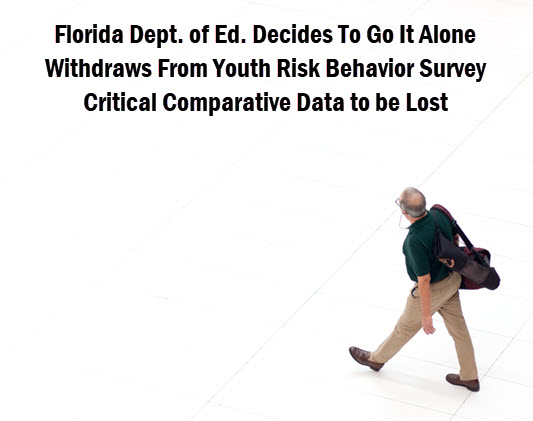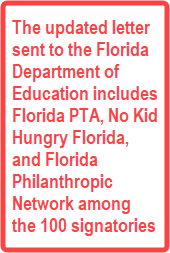Calls Expand for Florida Dept. of Ed. to Reverse Withdrawal from Youth Risk Behavior Survey
Posted May 27, 2022 11:45 am

Photo: David Lezcano via Unsplash
| Columbia County Observer
graphic
ORLANDO, FL – Florida officials’ abrupt decision to withdraw from the Centers for Disease Control and Prevention’s (CDC’s) Youth Risk Behavior Survey (YRBS) continues to worry advocacy groups, nonprofits, and others across the state.
Tuesday, they sent an updated letter to Florida Department of Education (FDOE) Interim Commissioner Jacob Oliva urging him to reverse the state's decision and expressing concerns over the state’s plan to create its own health risk behavior survey.
 The
100 signatories on the updated letter
include the 78 groups and individuals on the
original letter sent Tuesday to Oliva, along
with 22 new signatories, including Florida
PTA, No Kid Hungry Florida, Florida
Philanthropic Network, and several
foundations from across the state.
The
100 signatories on the updated letter
include the 78 groups and individuals on the
original letter sent Tuesday to Oliva, along
with 22 new signatories, including Florida
PTA, No Kid Hungry Florida, Florida
Philanthropic Network, and several
foundations from across the state.
Florida Policy Institute (FPI), who spearheaded the effort, noted that sending the letter again with the additional signatories was necessary to ensure that everyone who took issue with the state’s actions around the YRBS could have their voices heard.
Norín Dollard, Ph.D., senior policy analyst and KIDS COUNT® director at FPI, said, “The Youth Risk Behavior Survey has been a longtime trusted source of data on the health and well-being of Florida students, and more and more groups are raising the alarm on the state’s plan to create its own survey. We are very grateful to our partners speaking up in support of this resource and hope others are moved to voice their support.”
Jennifer Martinez, president of Florida PTA, said, “Florida PTA would like Florida to resume their participation in the Youth Risk Behavior Survey. Florida PTA uses the detailed data collected to align resolutions and legislative priorities to help us advocate for our most underserved and vulnerable children. Taking the time to create and pilot a new survey would contribute to children not receiving the valuable services they need.”
Florida has participated in the YRBS since 1991. Recently, however, the state withdrew from the survey, and the FDOE has indicated that the department will be developing its own health risk survey.
In the letter, the group notes that by exiting the YRBS, the FDOE will be forfeiting the recurring funding from the CDC to administer the survey. They point to the high cost of developing and testing a new, reliable instrument for measuring students' health and well-being.
The signatories also caution that implementing a new measure will "interrupt our ability to compare ourselves to the national average and to other states with similar populations." Creating a new baseline will negate the ability to see progress over time.
There are currently 47 states who participate in the YRBS, which —according to the CDC — monitors “health behaviors that contribute markedly to the leading causes of death, disability, and social problems among youth and adults in the United States.”
---
Sadaf Knight has over 12 years of experience in public policy research, advocacy and nonprofit management. She is CEO of Florida Policy Institute
Florida Policy Institute is an
independent, nonpartisan and nonprofit
organization dedicated to advancing state
policies and budgets that improve the
economic mobility and quality of life for
all Floridians.
KIDS COUNT® is a registered trademark of The
Annie E. Casey Foundation in the United
States and other countries and is used with
permission of the Foundation.

 By
Sadaf Knight
By
Sadaf Knight